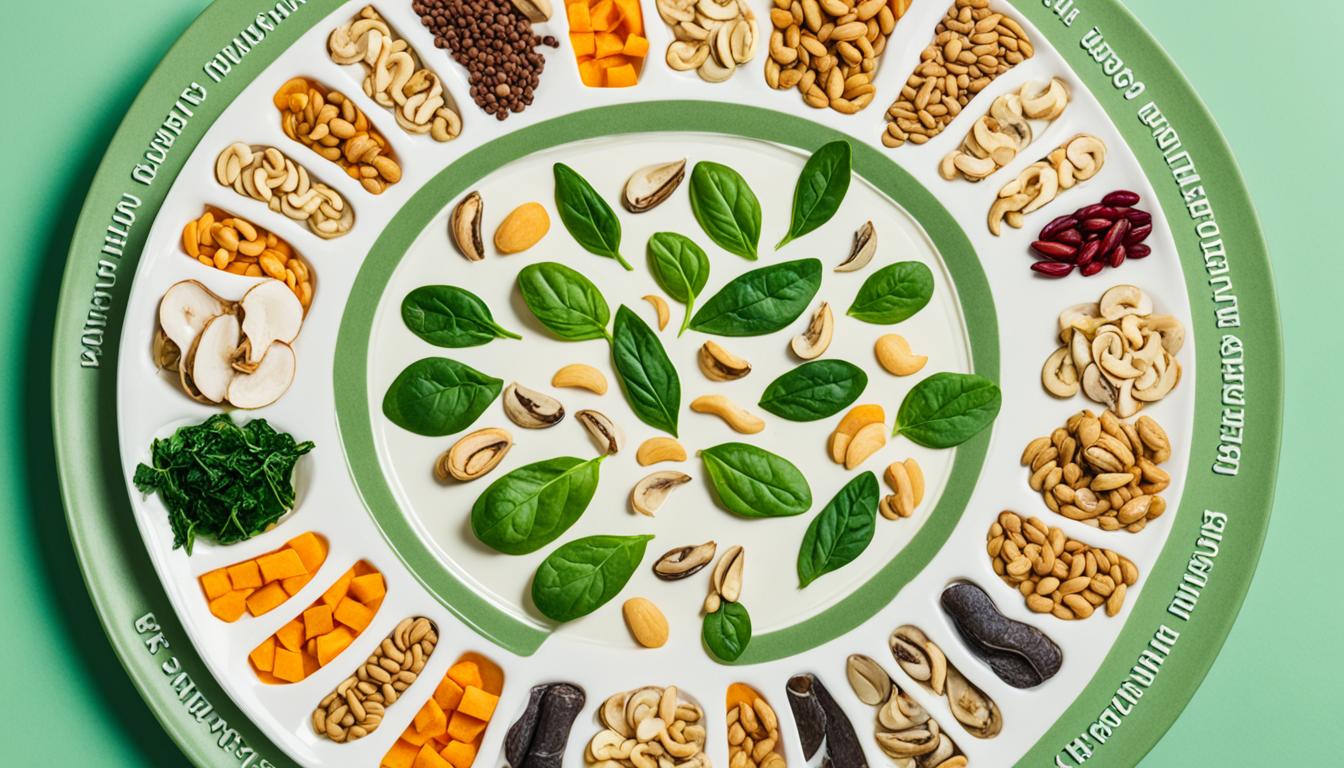Zinc Deficiency Symptoms: Spot the Signs
Zinc is an essential mineral that plays a crucial role in the body’s overall health and well-being. It is involved in various bodily functions, including immune system support, wound healing, and maintaining healthy hair and skin. However, a deficiency in zinc can have detrimental effects on our health.
Recognizing the signs of zinc deficiency early on is essential for prompt intervention and treatment. From skin changes to frequent infections, these symptoms can lead to long-term complications if left unaddressed.
In this article, we will explore the common signs and effects of zinc deficiency, its causes, how it can be diagnosed and treated, and the importance of prevention. So, let’s dive in and learn how to spot the signs of zinc deficiency and take steps to ensure optimal health.
Key Takeaways:
- Zinc deficiency can lead to various symptoms, including hair loss, frequent infections, and slow wound healing.
- Causes of zinc deficiency can include problems with absorption and inadequate dietary intake.
- Zinc deficiency can be diagnosed through blood tests and confirmed through a zinc supplement trial.
- Treatment for zinc deficiency involves zinc supplementation and dietary changes to increase zinc intake.
- The prevention of zinc deficiency can be achieved by maintaining a balanced diet that includes zinc-rich foods.
Zinc and its Importance for the Body
Zinc is a mineral that plays a crucial role in many essential functions and systems in the body. It is required for optimal health and well-being, supporting various physiological processes. From the immune system to wound healing, zinc is involved in numerous vital functions.
The immune system:
One of the key roles of zinc is its impact on the immune system. It helps maintain the proper functioning of immune cells, ensuring an effective response to invading pathogens. Zinc deficiency can compromise the immune system, leading to an increased susceptibility to infections.
Wound healing:
Zinc is also essential for wound healing. It plays a crucial role in the synthesis of collagen, a protein that forms the structural framework of the skin. Adequate zinc levels are necessary for proper tissue repair and regeneration. In cases of zinc deficiency, wound healing may be delayed, and complications can arise.
Blood clotting and thyroid function:
Besides its role in the immune system and wound healing, zinc is also involved in blood clotting and thyroid function. It contributes to the formation of blood clots, preventing excessive bleeding. Additionally, zinc is required for the production and regulation of thyroid hormones, ensuring proper metabolic function.
The senses of taste and smell:
Zinc is essential for the senses of taste and smell. It helps maintain the integrity of taste buds and olfactory receptors, enabling the perception of flavors and aromas. Zinc deficiency can result in a loss of taste and smell, affecting the overall enjoyment of food and beverages.
Growth and development:
Zinc is crucial for normal growth and development, especially during pregnancy, childhood, and adolescence. It supports the development of healthy tissues and organs, ensuring optimal growth. Adequate zinc intake is particularly important for pregnant women, as it promotes proper fetal development.
Overall, zinc is a vital mineral that is involved in essential functions within the body. From supporting the immune system and wound healing to playing a role in blood clotting, thyroid function, and the senses of taste and smell, zinc is integral to overall health and well-being.
Common Symptoms of Zinc Deficiency
A zinc deficiency can lead to various symptoms that can affect different parts of the body. Recognizing these symptoms early on can help identify and address the deficiency effectively. Here are some common symptoms of zinc deficiency:
1. More Frequent Infections
A weakened immune system is a common result of zinc deficiency. This can make individuals more susceptible to infections such as colds, flu, and respiratory tract infections.
2. Hair Loss
Zinc is vital for hair growth and maintaining healthy hair follicles. A deficiency can lead to hair loss, thinning hair, or even bald patches.
3. Skin Changes
Zinc plays a crucial role in maintaining healthy skin. Deficiency can cause skin changes characterized by dryness, rashes, acne, or eczema-like symptoms.

4. Eye Problems
Zinc deficiency may affect eye health and lead to various vision problems. Symptoms can include night blindness, sensitivity to light, and difficulty focusing.
5. Slow Wound Healing
Zinc is essential for the proper healing of wounds. A deficiency can delay the healing process, leading to slow wound closure and an increased risk of infection.
It is important to note that zinc deficiency can also cause other symptoms such as loss of taste and smell, gastrointestinal issues like diarrhea, and growth delays in children, which can impact their overall development and sexual maturity.
“The common symptoms of zinc deficiency include more frequent infections, hair loss, skin changes that resemble eczema, eye problems, and slow wound healing.”
If you experience any of these symptoms or suspect a zinc deficiency, it is advisable to consult a healthcare professional for proper diagnosis and guidance. In the next section, we will explore the causes of zinc deficiency and how it can be diagnosed.
Causes of Zinc Deficiency
Zinc deficiency can arise from various factors, including problems absorbing zinc from the diet and inadequate dietary intake. Some individuals are at a higher risk of developing zinc deficiency, such as older individuals, those with gastrointestinal diseases, vegetarians, and breastfed babies. The source of zinc in the diet also plays a crucial role in determining the risk of deficiency.
When it comes to absorbing zinc, plant-based foods pose a challenge as they contain phytates and fiber, which can inhibit zinc absorption. Conversely, zinc from animal-based foods is more easily absorbed by the body. This makes vegetarians who rely solely on plant-based sources for zinc more susceptible to developing a deficiency.
Inadequate dietary intake is another common cause of zinc deficiency. Individuals who do not consume enough zinc-rich foods in their diet may not meet their daily requirement of this essential mineral. This is especially relevant for breastfed babies, as breast milk may not provide sufficient zinc to meet their growing needs.
To summarize:
Causes of Zinc Deficiency:
- Problems absorbing zinc from the diet
- Inadequate dietary intake of zinc
- Consuming mainly plant-based foods
- Being a breastfed baby
Zinc Absorption and Plant-Based Foods
Plant-based foods contain compounds like phytates and fiber that can interfere with zinc absorption in the body. Phytates are naturally occurring substances found in whole grains, legumes, and some vegetables. While these compounds have health benefits, they can bind to zinc and form complexes that are not readily absorbed by the intestines.
Although plant-based foods can still contribute to zinc intake, individuals who rely heavily on these foods for their zinc needs should be aware of the potential for reduced absorption. To counteract this, various strategies can be employed to enhance zinc absorption from plant-based sources:
- Soaking, fermenting, or sprouting grains and legumes to reduce phytate content.
- Pairing zinc-rich plant-based foods with sources of vitamin C enhances zinc absorption. For example, add citrus fruits or bell peppers to a salad with spinach and nuts.
- Using yeast-leavened bread instead of sourdough is recommended, as yeast can degrade phytates.
While plant-based diets can be healthy and provide numerous benefits, extra attention should be given to meeting zinc requirements through a varied and well-balanced intake of zinc-rich plant-based foods.
Diagnosing Zinc Deficiency
Zinc deficiency can be diagnosed through a blood test, although it may not be reliable for mild deficiency. A zinc supplement trial is often used to confirm the diagnosis, as symptoms should improve within 72 hours of supplementation. Consulting a doctor is essential for proper diagnosis and treatment.
When suspecting zinc deficiency, a blood test can be a helpful diagnostic tool. However, it’s important to note that blood tests may not always accurately detect mild zinc deficiencies. Mild deficiencies may not always be reflected in blood zinc levels, making the results unreliable in such cases.
A more effective way to confirm a zinc deficiency diagnosis is by conducting a zinc supplement trial. The patient is provided with a zinc supplement, and their response to the supplementation is monitored. Symptoms of zinc deficiency should show improvement within 72 hours of supplementation, further confirming the diagnosis.
It is crucial to consult with a healthcare professional or doctor for an accurate diagnosis and an appropriate treatment plan. They will consider the patient’s medical history, symptoms, blood test results, and response to zinc supplementation to provide a comprehensive assessment and treatment recommendation.
Noteworthy Quote
“A zinc supplement trial is often used to confirm the diagnosis of zinc deficiency, as mild deficiencies may not be reliably detected through a blood test alone.”
Consulting a doctor is essential for diagnosing and treating zinc deficiency, as they can provide personalized guidance and recommendations based on an individual’s specific circumstances.
Treating Zinc Deficiency
The treatment for zinc deficiency involves a combination of zinc supplements and dietary changes. Zinc supplements are usually available in the form of pills or capsules. However, it is important to follow the recommended dosage and consult with a healthcare professional, such as a doctor or pharmacist, before starting any supplementation.
In addition to supplements, incorporating zinc-rich foods into your diet can help boost zinc levels. Examples of zinc-rich foods include:
- Red meat
- Poultry
- Oysters
- Beans
- Nuts and seeds
These foods not only provide a natural source of zinc but also offer other essential nutrients. It’s important to note that certain plant-based options may provide zinc as well, although they may be less bioavailable compared to animal-based sources.
By including these zinc-rich foods in your diet and following the recommended zinc supplementation, you can help address zinc deficiency and support optimal health.
Prevention and Lifestyle Tips
To prevent zinc deficiency, it is important to maintain a balanced diet that includes zinc-rich foods. By incorporating these foods into your daily meals, you can ensure that you are meeting your body’s zinc needs and reducing the risk of deficiency.
Here are some excellent sources of zinc:
- Poultry: Chicken and turkey are good sources of zinc and can be easily incorporated into various dishes.
- Meat: Red meat, such as beef and lamb, is rich in zinc and can provide a significant boost to your zinc intake.
- Seafood: Fish and shellfish, especially oysters, are known for their high zinc content.
- Cereals: Wholegrain cereals like oats and wheat bran are commonly fortified with zinc, making them a convenient option.
- Legumes: Beans, lentils, and chickpeas are not only rich in zinc but also offer a variety of other health benefits.
- Nuts and seeds: almonds, pumpkin seeds, and cashews are examples of nuts and seeds that contain zinc.
- Dairy products: Milk, cheese, and yogurt are not only excellent sources of calcium but also provide zinc.
Knowing how much zinc you need is crucial to maintaining optimal health. The recommended daily intake of zinc varies based on age and gender. Consulting a healthcare professional or nutritionist can help you determine your specific zinc requirements.
In addition to including zinc-rich foods in your diet, it is worth noting that the body’s ability to absorb zinc can be affected by other factors. For example, high levels of calcium and iron can interfere with zinc absorption. Therefore, it is important to balance your nutrient intake and consider the overall nutrient composition of your meals.
Remember, prevention is key when it comes to zinc deficiency. By adopting a zinc-rich diet and making informed dietary choices, you can safeguard your health and well-being.

Zinc-Rich Foods
| Food Group | Examples |
|---|---|
| Poultry | Chicken, Turkey |
| Meat | Beef, Lamb |
| Seafood | Oysters, Fish |
| Cereals | Oats, Wheat Bran |
| Legumes | Beans, Lentils, and chickpeas |
| Nuts and Seeds | Almonds, Pumpkin Seeds, and cashews |
| Dairy Products | Milk, Cheese, and yogurt |
THEREFORE,
Undeniably, zinc deficiency poses significant risks and complications for one’s health. A deficiency in this vital mineral can lead to impaired immune function, leaving the body more susceptible to infections and illnesses. Furthermore, delayed growth and development can occur, particularly in children, hindering their overall well-being.
Early detection and timely treatment of zinc deficiency are paramount to mitigating these risks. By regularly monitoring zinc levels in the body, individuals can proactively address any deficiencies and take the necessary steps to restore optimal zinc levels. This can be achieved through zinc supplementation, as prescribed by healthcare professionals, alongside dietary changes that incorporate zinc-rich foods.
In order to prevent zinc deficiency and maintain a healthy balance, it is crucial to prioritize a well-rounded diet that includes ample zinc sources. Incorporating dairy products, poultry, meat, seafood, cereals, legumes, nuts, and seeds into daily meals can provide an adequate zinc intake. Consulting with healthcare professionals or nutritionists can offer personalized guidance and ensure individual zinc requirements are met.
Overall, understanding the risks and complications associated with zinc deficiency highlights the importance of zinc in supporting optimal health. By taking proactive steps to maintain sufficient zinc levels, individuals can safeguard their immune function, promote healthy growth and development, and reduce the likelihood of complications arising from zinc deficiency.
FAQ
What are the symptoms of zinc deficiency?
What causes zinc deficiency?
How is zinc deficiency diagnosed?
What is the treatment for zinc deficiency?
How can zinc deficiency be prevented?
What are the health risks and complications of zinc deficiency?









